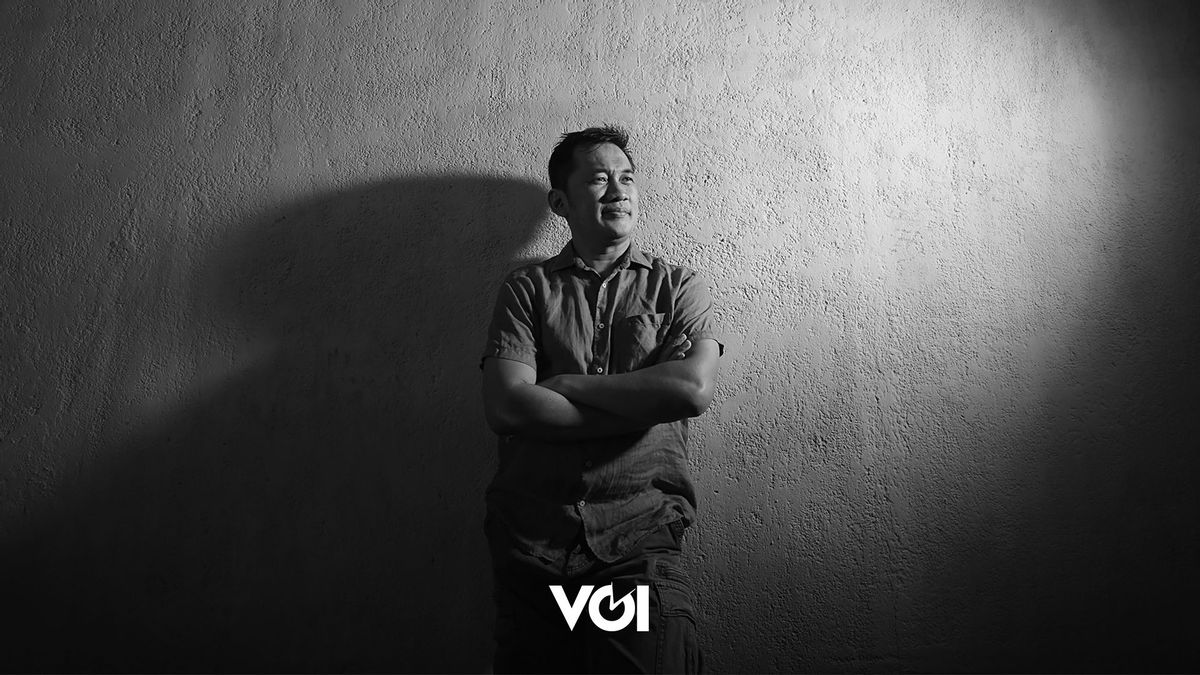JAKARTA - The 71st National Film Day, which falls on March 30, 2021, is also the 100th anniversary of the Indonesian film figure, H. Usmar Ismail. Director Hanung Bramantyo has deep thoughts on how to commemorate National Film Day this year.
The wave of the COVID-19 pandemic is hitting Indonesian films very hard. Filming was restricted, cinemas stopped operating, everyone who had been relying on films for their livelihoods suddenly lost their support. This year's National Film Day provides a reflection for Hanung Bramantyo. "The reflection is a journey from the film which turns out from time to time to build a culture of shooting historical events. Generational events have been formed from the beginning until now. From there we can see that the film grows like a human being.
"From black to white, no sound, then there's sound, then there's color, and then there's computer graphics animation. And it has a significant impact on society, film according to the times, in which there are struggles of thought, struggles of ideology. And according to times, this country will change gradually. Listen to a changing order, with a changing regime, with different thoughts, and that affects the socio-cultural conditions in that culture," said Hanung during an exclusive chat with VOI Crews, Monday, March 21.
The husband of Zakia Adya Mecca gave an example that films produced in 1950 compared to films that are currently emerging certainly have different technology but have content that is not much different from human-to-human relationships. "National film day must be interpreted as a reflection, especially in the present year national films are really hit by a crisis. This is not the first crisis. We have experienced a crisis for years, from the crisis of the emptiness of national films in the 90s. Indonesian films fell. "To the abyss of the image, eroticism spills, until finally, it turns into a golden era of film where one film can get 5-6 million viewers," he explained.
The COVID-19 pandemic has never been taken into account by Indonesian filmmakers. "From 2020, we are in a situation of extraordinary crisis due to the COVID-19 pandemic. Because there is an understanding that cinemas are a vulnerable place to be a place for the spread of the COVID-19 virus. That's why cinemas are closed. Now there are already some that have already been there. open, but not 100 percent, there is a distance between one viewer and another. This is what made the film, which initially had more than 30 million viewers a year, now immediately drops to a maximum of only 500 thousand viewers," he explained.
The facts on the ground are that the Indonesian film which reached the box office currently entitled Asih 2 only has 250,000 viewers. Even though the potential of this film can be 2 million viewers. "So the decline is almost 90%, that's why this filming day should be a deeper reflection. What is the meaning of Indonesian films for the Indonesian people? Are Indonesian films still important in our lives," he said.
What made Hanung feel cramped was that, during the pandemic, filmmakers felt very well that films were viewed as insignificant because both filming and film windows were closed. "The film is then packaged from the big screen into a cellphone screen. The film workers who usually can generate economic income for their families eventually become empty. And the attention of the government and society on films is not 100%. We see many film workers who swerve to become culinary workers, deliverers of parcels, even though they are well-known great directors, I personally ended up unable to do anything about it. And returned to the phase of making films with what we have with our cellphones and showing them on YouTube. This is the meaning of national film day with very deep reflections," he explained.

Even though it is difficult, the director of the film Ayat Ayat Cinta cannot escape from his great love for the film. Can not turn away, can only adapt. "I love films. I still have optimism that Indonesian films will continue to be loved by Indonesian film audiences as well as outside Indonesia. I heard that many people outside are starting to look to Asia, are starting to see Indonesian films. Starting there are communities of old film lovers, Barry Prima, Advent Bangun, it is starting to emerge. There are foreigners who admire Indonesian films like that," he said.
"Indonesian film actors, young film directors are starting to appear. Tilik's short film, which has an audience of 27 million viewers, is phenomenal in the midst of a pandemic crisis situation. Our unfamiliar filmmakers have appeared in the world of films. For me, this is very proud. If not accompanied by a pandemic crisis. with love, affection for the film, impossible for all of this can happen," he added.
Love is what makes Hanung never feel complacent. "I can not judge my own work, I feel when asked I always feel that I am lacking. Actually, my achievements are not works that win a box office or an award, yes, I will not reject pride when receiving it. But deep down in my heart that My wish is that the products produced from the National film can be the pride of the Indonesian people," he explained.
His job is not just to create films anymore, Hanung feels he has an obligation to create opportunities for regeneration. "I have to achieve that hope continuously by regenerating. I must demand to make the best possible film, fight with conditions that are not possible. While giving opportunities to new directors from Iqbaal Rais, Fajar Nugros, Fajar Bustomi, and everyone who moves, not only in the field of directing. There are those who are engaged in editing, as well as art directors. There are many things I want to grow outside of myself. And that is part of my commitment to create audiences to love Indonesian films themselves," he explained.
Tugasnya bukan cuma sekedar menciptakan film lagi, Hanung merasa punya kewajiban untuk menciptakan peluang regenerasi. "Harapan itu harus terus menerus saya capai dengan melakukan regenerasi. Saya harus menuntut membuat film sebagus mungkin, berperang dengan kondisi yang tidak memungkinkan. Sambil memberikan kesempatan pada sutradara baru dari Iqbaal Rais, Fajar Nugros, Fajar Bustomi, dan semua siapapun yang bergerak tidak hanya di bidang penyutradaraan. Ada yang bergerak di editing, art director juga. Banyak hal yang ingin saya tumbuhkan di luar diri saya. Dan itu bagian dari komitmen saya agar supaya menciptakan penonton agar mencintai film Indonesia itu sendiri," jelasnya.
また読む:
Indonesian films cannot only be concentrated on filmmakers. Hanung has high hopes for the government's support for Indonesian films in the future. "To the Indonesian government, whoever the president is, please give priority to national films. This is not only forming a BPI but also providing a budget that should be proportional, especially for making education of films, holding workshops, or sending those young generations to come out to study film. Not only one person but maybe ten persons, twenty persons, one generation to study film abroad and return to Indonesia to build Indonesian films. This has been done by the Korean government," he hoped.
Apart from developing human resources through education, the supporting infrastructure for Indonesian films must also be considered. "How a studio should be built, incentives for films that have no commercial potential but have creative exploration such as documentaries, film art, those should be provided with distribution channels, storefronts, and support for good films in Indonesia that want to take part in the international arena," said Hanung.
It is hoped that the involvement of Indonesian films in various film festivals in the world can provide greater distribution opportunities so that more people enjoy Indonesian films. "To participate in festivals abroad such as Cannes, Toronto, Sundance, etc., it requires large funds to open a window, to open a booth filled with quality Indonesian films where Indonesian films are so that the world can see Indonesian culture from Indonesian films. This is what I hope that the government is involved. Because without the government, I work alone, Joko Anwar works alone, Mira Lesmana works alone, there is no umbrella that provides legal protection, funds, facilitation that will make Indonesian films more developed," he said.

Hanung acknowledged that the challenges for Indonesian cinema during this pandemic are very tough. However, they didn't want to give up. Even to voice their uneasiness, they held back. Because they are aware that the audience needs entertainment, it does not add to the burden by seeing the current condition of Indonesian cinema.
"During this pandemic, many films that have been filmed, are ready to air, they all stop. Automatically in this one year, no film production is done ideally. All film production must be done with compromise on circumstances. So starting from the first 3 months. I can't imagine how film crews who usually celebrate Eid by giving new clothes to their children, suddenly there is no money to buy it all because all film artists, film laborers, film creatives all stop in the first three months," he recalls.
The director of the film Bumi Manusia tells of the hassle of filming in the midst of a pandemic. "After the pressure to open the first PSBB, finally a new normal state emerged. This situation was not immediately followed by the freedom to shoot in any location. For example, my film Gatotkaca had to stop shooting, had to withdraw at an indefinite time limit. Then I found a gap to be able to shoot, but limited," he said.
The film Gatotkaca was planned to be shot in 6 regions in Indonesia, but due to the pandemic's restrictions, it finally narrowed that it could only shoot in Jogja, more specifically at the Gamplong studio. "So we have to make a compromise, the scenario that initially happened in our city was changed to an isolated place, because we cannot touch the city at all because it is related to the pandemic. Besides that, the financing is also swollen because of what? Because there are rapid tests, PCR tests, Before entering the location, all of them have to be tested for antigen or rapid test, which costs around Rp. 200-300 thousand. Imagine having to do tests for 300 people in the production team. That's an extraordinary increase in spending," he said.
The owner of Dapur Film also saw investors' anxiety because the cinema was still closed. "Imagine that investors pay quite a lot of money but they don't know where the film will be shown. The sponsors have already spent the funds, but they don't know the placement of their brand where the film is, because the cinema is closed.
The second PSBB presented a more complicated situation, after the situation was opened and it was closed again, it was getting more difficult to shoot because the Civil Service Police Unit was disbanded. Workers in films, soap operas, big screens, advertisements have to deal with security guards and people who refuse to shoot, even though we are all looking for food," he explained.
Never giving up, Hanung saw that this was a tough test that made him think and compromise until he finally found a creative solution. "Because the audience doesn't care about all of that, the audience can't help but see the film process. They need entertainment, high exploration, this is a challenge for all of us. We can't give a complaint to the audience, the audience doesn't want to accept it all. The audience only needs good entertainment, precisely in the midst of a pandemic, they want interesting entertainment. This is what makes us keep racking our brains to give our best," he said.

Cloudy is not always gray, rainbows only appear after rain, likewise, pandemics do not always mean negative things for Hanung Bramantyo. By chance, Hanung was in Jogja at the beginning of the pandemic. When restrictions apply, Hanung can only stay in his hometown.
"Actually, I was trapped in Jogja, at that time I was working on the film Ibu and Surga Yang Tidak Dirindukan 3. While filming I was also preparing for the film Tersanjung which already premiered at that time. And at the same time, I was also preparing for the film Gatotkaca. Actually, there were 4 productions. At the same time, in Tersanjung's premiere, there was news that 100 people exposed to COVID-19. The situation for this Glorious premiere was different. There were not as many visitors as usual, because people were afraid to go out until the next morning they had to return to Jogja to shoot. Suddenly during filming, we had to lockdown. And one of the crews of the film Surga Yang Tidak Dirindukan 3 had an indication of being exposed to COVID, from there we all panicked because we were afflicted with news and the polarization of news that said COVID was dangerous, so it made all of us think that if we were still filming we will die. That construction that made us decide everything had to stop," he recalled.
Even though the filming time is only one week away, the cast and crew are already panicking and want to return to their respective families so that filming cannot continue. "From there I was trapped in Jogja. I couldn't go anywhere, I happened to have a house 2-3 years ago in Jogja preparing a permanent place if I was in Jogja. I thought at that time I would be in that house for 2-3 months, maybe. After Eid, I was able to return to Jakarta. It turned out that there was no news that the exposure had subsided, but instead, it was getting up and up. Plus the decision for the film Gatotkaca referred to shooting in Jogja, I ended up in Jogja with my family," he recalls.
It turned out that this opportunity was the longest time I spent with my family in Jogja. "Zaskia, who was pregnant and gave birth in Jogja. I tried to adapt to the pandemic, shot with my own equipment, used a cellphone, and uploaded it on YouTube. Actually, this pandemic is a blessing for my family. Because I rarely stay at home together for 24 hours all the time. being in the same house. Besides I have to be concerned, I enjoy the 24 hours of activities of my children how they grow. I see every growth, I usually leave my pregnant wife anywhere, this time I know all the struggles of pregnancy," explained the father of five children.
Another good news is that the Gamplong studio, which was originally only for filming Sultan Agung, Bumi Manusia, and Habibie Ainun, later became an economic field during the pandemic. "I get income because many people come for recreation, grow the economy of the studio keepers and the surrounding community. This studio is also a problem solver when we can't shoot outside, this can be a solution. Like it or not I have to create a city set there," he explained.

Other good news has emerged, the film Surga yang Tidak Dirindukan 3 finally airs on Disney + Hotstar, after being adrift for a long time. Even though Hanung actually initiated the film Surga yang Tidak Dirindukan 3 to introduce director Pritagita Arianegara to box office commercial works. "Prita is one of the directors whose career started as a script recorder, who eventually became the director of the film Sawalaku, Surga di Atas Langit. Her work makes me proud. That's why I challenged him to direct the film Surga Yang Tidak Dirindukan 3 because I wanted to make room for a new director. "To create commercial works, just like Fauzan Rizal's opportunity for Habibie Ainun, I want Prita to also be known for the film Surga Yang Tidak Dirindukan 3," he explained.
The sequel of the film Surga Yang Tidak Dirindukan always has a good audience and penetrates the box office. "I hope that Prita will be better known when Surga Yang Tidak Dirindukan 3 reaches the box office. Everything has been prepared in such a way, with Producer Mr. Manoj and Asma Nadia as the story owners so that it can become a box office in 2020 at that time. But then there was a pandemic and everything was suspended. "Until finally, I got the news that this film will be shown on OTT, this made me have to adapt," he said.
Destiny always has its own path, this is the same when Prita then had to introduce her work through OTT. "I have to compromise with a new medium, namely OTT. In OTT, it is difficult for us to measure whether a film enters the box office or not because there is no data that is as clear as YouTube. Once I searched for data on the internet, we did not get it. There is a new paradigm, a new situation that I have to adapt to. Will Prita be known for Surga Yang Tidak Dirindukan 3? I don't know.
What is this for? So that there is regeneration, I am not alone in campaigning for the public to love Indonesian films. To give opportunities to young people who love Indonesian films, Prita is one of them," he explained.
Not only through films, but it also turns out that Hanung is very consistent and open when talking about gender equality through films. It is proven in the selection of Pritagita Arianegara as the director of Surga Yang Tidak Dirindukan 3. Hanung is sure that the message of gender equality that he is fighting for in the film will not be in vain.
"Every time I choose the theme of the topic based on what I can, based on what is happening in my immediate environment. When I chose to make Ayat Ayat Cinta, my friend was very close to me. The theme of the love relationship between men and women. How they got married and later polygamy and all kinds, it is a situation that is close to me, I was born from a very patrilineal family in a Javanese environment, the first child, male, Islamic, and has younger sisters. Set up to become a man who leads. Moreover, in Islam, the understanding is given to men as imams. Men, which, unfortunately, is interpreted by female leaders as objects," he explained.
So far, leaders have always been synonymous with great strength, dominating, the patron of the king who has power. Hanung had been at that point. "At that time I made women an object, satisfying my existence, a guy if he didn't have a girlfriend would feel humiliated. Singles need women to be used as objects to strengthen male identity. The more men have girlfriends, the more legitimate that men are handsome. I indirectly hurt the feelings of my mother who is also a woman. It hurt my younger siblings, to the point that it hurt my wife's feelings which eventually resulted in the divorce. It all reconstructed my thinking as if I was ignorant of gender equality," he recalled.

Gender equality, according to Hanung, means that women and men have the same position. "In fact, women should be higher in rank than men. That is stated in the attitude of the Prophet, especially his wife, Siti Khadijah, who is very rich, very powerful, which is truly praised by Rasulullah. Even to the point of placing heaven under the feet of the mother, the mother is a woman. Then there is a hadith that says who should be respected, your mother, your mother, your mother, your father. This means that mothers have a degree three times higher than men. Gender equality for me is not just equal, women should be higher," he explained.
Not a dreamer, according to him, men should be able to protect women. "What should a man protect from a woman? First, her uterus, menstrual cycle, and breasts of women. These three are the source of human life. Apart from these three, women have the same right to study and work. Everything comes out of my mouth not suddenly arrived, because many events that happened in the past hurt my mother's heart, my younger siblings, my former wife, I felt I had to fix all of that," said Hanung.
"Films are my catalyst, the results of my reflections I put out in the film Ayat Ayat Cinta, Surga Yang Tidak Dirindukan 3, until the climax is Kartini's film. Kartini is my admiration for female figures, so actually, my choice of gender equality does not necessarily require a trend or world curator, no. It's a process that comes through my inner struggles," he stressed.
Consistently raising gender equality friends for decades, Hanung believes films can change the mindset of society. "I am 100% sure I remember that in the 1990s there was a Ghost film starring Demi Moore that could influence millions of women to dare to cut their hair short. Even though at that time the female beauty icon was marked by long hair, Demi Moore was able to change that," he explained.
In Indonesia, Hanung himself has felt a real change in society after the film Ayat-Ayat Cinta was broadcasted. "Before this film existed, women in headscarves were in an exclusive position, marginalized until Cak Nun made a performance of the Ocean of the Jilbab, which contained claims of people wearing hijabs that discriminated against veiled people. Now, with the existence of the Ayat-Ayat Cinta, the situation in the Muslim community has moved to fight back, that Muslims are not merely divine, very absurd abstractly, but Islam is engaged in Muslim campaigns as well as intellectuals, cultured, smart, not just a society that is divided into certain boarding school, in certain organizations, we can socialize as modernly, we can have a sense of love that brings romance. Ayat-Ayat Cinta became a catalyst that underlines it all. Until finally, young people are proud to work, veil, even the TV industry which usually shows Islamic soap operas only during Ramadan, then January-December continues," he explained.
Hanung believes that films can drive changes in age, generations. "The film Pengabdi Setan changes the way of watching good horror films. Dilan brings back the 90s generation because Iqbal Ramadan played a role in it," he said.
That belief has made Hanung welcome the reopening of theaters on April 1. "I heard that cinemas will be opened for the public to re-enjoy cinemas by still applying the protocol, distance. For me, this is something positive, which initially only in big cities can now be in all regions. This is a breath of fresh air for National films because the quota is 50. The percentage of cinema capacity only occurs in big cities, so the audience gain will be very limited. I hope that with fairly tight security, the box office achieved by Asih 2 of around 250,000 viewers can increase to 500,000 and then 1 million viewers, a significant impact on Indonesian cinema," he hoped.
The vaccinations that have been carried out by the government give hope that this pandemic condition will soon be resolved. "The only hope is placed on the government how they encourage people to return to the cinema. The government provides a comprehensive vaccine to the community. Currently, those who have been vaccinated by health workers, the elderly, myself, and my artist friends in Jogja encourage the governor to give encouragement so that artists, film workers to be vaccinated. Young people must want to be vaccinated because it is our immunity so that we are confident in doing activities like before the pandemic, sure to go to the cinema to watch Indonesian films again," he said.
And one thing is for sure, filmmakers also have to make good films. "So that viewers who have been out of the house to go to the cinema are not disappointed. Because of that, together with the film community, the campaign together shows that Indonesian films are getting better so there is no need to be afraid of being disappointed in watching Indonesian films," he said.
[/ read_more]
The English, Chinese, Japanese, Arabic, and French versions are automatically generated by the AI. So there may still be inaccuracies in translating, please always see Indonesian as our main language. (system supported by DigitalSiber.id)


















